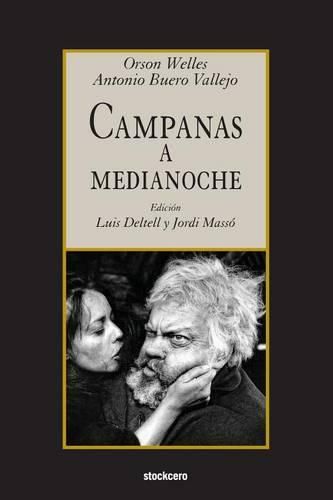Readings Newsletter
Become a Readings Member to make your shopping experience even easier.
Sign in or sign up for free!
You’re not far away from qualifying for FREE standard shipping within Australia
You’ve qualified for FREE standard shipping within Australia
The cart is loading…






This title is printed to order. This book may have been self-published. If so, we cannot guarantee the quality of the content. In the main most books will have gone through the editing process however some may not. We therefore suggest that you be aware of this before ordering this book. If in doubt check either the author or publisher’s details as we are unable to accept any returns unless they are faulty. Please contact us if you have any questions.
This book sheds light on a practically unknown fact about one of the most studied and commented film of all times: Spanish playwright Antonio Buero Vallejo’s involvement in Orson Welles’ Chimes at Midnight production.
Welles was fastidious with his films’ dubbing into different languages, making a point about preserving the literary quality of the original work in the translated versions.
More so in this case, in which the main character Falstaff was masterfully constructed by a careful selection of William Shakespeare’s original texts.
Bearing this in mind, the Spanish producer Emiliano Piedra seeked the help of playwright Antonio Buero Vallejo, who shortly before had experienced a remarkable public and critique success with his Spanish version of Hamlet.
The requirement was to translate the Elizabethan lines into the equivalent sound of the Spanish Golden Century Picaresque .
Quite paradoxically, the perfect adjustment of the Spanish playwright’s text to the prerequisite increased the producers’ concern about whether the new Welles’ film would or would not be commercially successful , a fear that traditionally haunted every Orson Welles production.
At the end the option was to use a more common sounding language, unwillingly restraining the full appreciation of Orson Welles’s craftsmanship to the English speaking audiences, while depriving the Spanish speaking public of such a creative prowess.
When Buero Vallejo found out that his work had been tampered with beyond recognition he demanded his name to be withdrawn from the film’s credits. Since then his script was presumed disappeared.
In the present edition professors Luis Deltell and Jordi Masso unearth and discuss the unpublished text, thus offering the Spanish speaking readers the possibility to enjoy the Welles creation throughout an experience equivalent to the English speaking audiences’ the tone and literary quality of the dialogue lines that make Chimes at Midnight one of the most emblematic film productions.
$9.00 standard shipping within Australia
FREE standard shipping within Australia for orders over $100.00
Express & International shipping calculated at checkout
This title is printed to order. This book may have been self-published. If so, we cannot guarantee the quality of the content. In the main most books will have gone through the editing process however some may not. We therefore suggest that you be aware of this before ordering this book. If in doubt check either the author or publisher’s details as we are unable to accept any returns unless they are faulty. Please contact us if you have any questions.
This book sheds light on a practically unknown fact about one of the most studied and commented film of all times: Spanish playwright Antonio Buero Vallejo’s involvement in Orson Welles’ Chimes at Midnight production.
Welles was fastidious with his films’ dubbing into different languages, making a point about preserving the literary quality of the original work in the translated versions.
More so in this case, in which the main character Falstaff was masterfully constructed by a careful selection of William Shakespeare’s original texts.
Bearing this in mind, the Spanish producer Emiliano Piedra seeked the help of playwright Antonio Buero Vallejo, who shortly before had experienced a remarkable public and critique success with his Spanish version of Hamlet.
The requirement was to translate the Elizabethan lines into the equivalent sound of the Spanish Golden Century Picaresque .
Quite paradoxically, the perfect adjustment of the Spanish playwright’s text to the prerequisite increased the producers’ concern about whether the new Welles’ film would or would not be commercially successful , a fear that traditionally haunted every Orson Welles production.
At the end the option was to use a more common sounding language, unwillingly restraining the full appreciation of Orson Welles’s craftsmanship to the English speaking audiences, while depriving the Spanish speaking public of such a creative prowess.
When Buero Vallejo found out that his work had been tampered with beyond recognition he demanded his name to be withdrawn from the film’s credits. Since then his script was presumed disappeared.
In the present edition professors Luis Deltell and Jordi Masso unearth and discuss the unpublished text, thus offering the Spanish speaking readers the possibility to enjoy the Welles creation throughout an experience equivalent to the English speaking audiences’ the tone and literary quality of the dialogue lines that make Chimes at Midnight one of the most emblematic film productions.